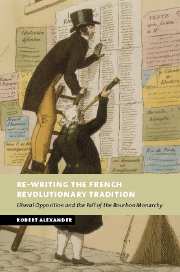 Re-Writing the French Revolutionary Tradition
Re-Writing the French Revolutionary Tradition Published online by Cambridge University Press: 04 December 2009
THE DECAZES EXPERIMENT
During verification procedures for the new parliament, Villèle denounced Louis-Antoine Malouet for interfering in elections in the Pas-de-Calais and, as evidence, gave the press a prefectoral letter urging voters not to support Deputies of the previous Chamber. In the Peers, Chateaubriand called for investigation of ministerial corruption.
While out of power, ultraroyalists attacked executive despotism, criticizing the practice of making Deputies civil servants, or promoting Deputies who already held government office. Such ‘favours’ enhanced cabinet influence by reducing parliamentary independence. In 1816 an ultraroyalist Deputy proposed a complete ban on holding both positions, and in January 1817 Villéle suggested adoption of the British model, whereby Deputies must seek re-election after appointment or promotion. Both propositions were designed to hamper the cabinet from corrupting elections, and both ran aground against warnings of the danger of restricting royal prerogative. Even the doctrinaire Pierre-Paul Royer-Collard, generally associated by historians with advocacy of constitutional checks and balances, argued against excessive division of powers. Villèle replied that he wanted to secure a Chamber sufficiently independent to inform the king of the truth. Subsequently, the electoral law of 1817 did establish that prefects and military commanders were ineligible to run in the departments they administered, but went no further.
The first two years of the Restoration deeply influenced left-wing opposition by entrenching resistance to ultraroyalism, but a more complex dynamic emerged after the elections of 1816.
To save this book to your Kindle, first ensure [email protected] is added to your Approved Personal Document E-mail List under your Personal Document Settings on the Manage Your Content and Devices page of your Amazon account. Then enter the ‘name’ part of your Kindle email address below. Find out more about saving to your Kindle.
Note you can select to save to either the @free.kindle.com or @kindle.com variations. ‘@free.kindle.com’ emails are free but can only be saved to your device when it is connected to wi-fi. ‘@kindle.com’ emails can be delivered even when you are not connected to wi-fi, but note that service fees apply.
Find out more about the Kindle Personal Document Service.
To save content items to your account, please confirm that you agree to abide by our usage policies. If this is the first time you use this feature, you will be asked to authorise Cambridge Core to connect with your account. Find out more about saving content to Dropbox.
To save content items to your account, please confirm that you agree to abide by our usage policies. If this is the first time you use this feature, you will be asked to authorise Cambridge Core to connect with your account. Find out more about saving content to Google Drive.